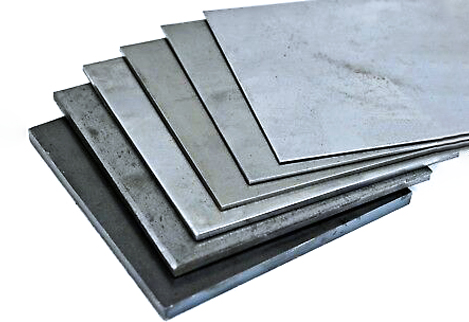Galvanized Steel: Protection, Processes, and Practical Applications
Galvanized steel is a versatile and widely used material known for its exceptional durability and resistance to corrosion. The galvanization process involves coating steel with a layer of zinc, which provides a robust shield against rust and extends the lifespan of steel structures and components. This article explores the protection mechanisms, galvanization processes, and various practical applications of galvanized steel.
Protection Mechanisms
galvanised steel achieves corrosion resistance through several key mechanisms:
-
Barrier Protection: The zinc coating forms a physical barrier that shields the underlying steel from moisture, oxygen, and other corrosive elements. This barrier prevents direct contact between the steel surface and the environment, thereby inhibiting rust formation.
-
Cathodic Protection: Zinc is more electrochemically reactive than steel. As a result, even if the zinc coating is scratched or damaged, it sacrificially corrodes in preference to the steel. This sacrificial protection ensures that the steel remains protected as long as there is sufficient zinc present.
-
Self-Healing Properties: When exposed to the atmosphere, zinc naturally reacts with carbon dioxide and moisture to form a protective layer of zinc carbonate. This layer acts as a self-healing barrier that further enhances the steel’s resistance to corrosion.
Galvanization Processes
There are several methods of galvanizing steel, each suited to different applications:
-
Hot-Dip Galvanizing: This is the most common method where steel is dipped into a bath of molten zinc. The immersion results in a thick, durable coating that adheres tightly to the steel surface, providing long-lasting protection.
-
Electro-Galvanizing: In this process, zinc is applied to the steel surface using an electric current. It produces a thinner coating compared to hot-dip galvanizing and is often used for smaller and more intricate steel components.
-
Zinc Spray Galvanizing: Zinc is sprayed onto the steel surface using a special spraying gun. This method is suitable for on-site applications or repairs where hot-dip galvanizing is not feasible.
Practical Applications
galvanised steel finds extensive use across various industries and applications due to its protective properties and durability:
-
Construction: Galvanized steel is commonly used for structural components such as beams, columns, and roof trusses in buildings and infrastructure. Its resistance to rust makes it ideal for outdoor and coastal construction projects.
-
Automotive: In the automotive industry, galvanized steel is used for car body panels, chassis components, and underbody parts. Its corrosion resistance enhances the longevity and safety of vehicles.
-
Infrastructure: Bridges, highways, and utility poles benefit from galvanized steel’s ability to withstand harsh environmental conditions and reduce maintenance requirements over time.
-
Household Appliances: Galvanized steel is also used in appliances such as washing machines, refrigerators, and air conditioning units where moisture resistance is crucial.
-
Agriculture: Agricultural equipment, fencing, and storage tanks are often made from galvanized steel to withstand outdoor exposure and corrosive substances like fertilizers and pesticides.
Conclusion
Galvanized steel is a preferred choice in many industries due to its effective corrosion protection, durability, and versatility. The galvanization process, whether hot-dip, electro, or zinc spray, ensures that steel components maintain their integrity and functionality over extended periods. From construction and automotive to household appliances and agriculture, galvanized steel plays a crucial role in enhancing product lifespan and reducing maintenance costs. Understanding its protective mechanisms and practical applications helps industries and consumers alike make informed decisions about using galvanized steel for their projects and products.

Related Posts
December 30, 2024 0
How To Make Weekend Greetings More Fun?
Let’s describe how “I hope you had a great weekend.” The day of the week is an essential way of giving the human...
READ MORE
December 23, 2024 0
What Are the Different Ways to Write “How Have You Been?”
The phrase “How have you been?” bears a lot of warm interest, goodwill, and an inquiry about the person’s welfare. Whether in person, through...
READ MORE
Recent Post
What is The Meaning of a Medusa Tattoo?
January 9, 2025
The Meaning of Encanto in Spanish and Origin
January 4, 2025
Equivalent Phrases For “Including But Not Limited To”
December 30, 2024
How To Make Weekend Greetings More Fun?
December 30, 2024
10 Modern Sayings Similar To “Be There Or Be Square”
December 30, 2024
CONTACT

ARCHIVES
Tag
- 303 Stainless Steel Round Bars
- Adult Driving School Near Me
- adult orthodontics treatment
- Affordable Braces Miami
- affordable braces near me
- affordable orthodontist near me
- Affordable SEO UK
- agarwood
- Alloy steel pipe suppliers in India
- Aluminium sheet
- Aluminium tube
- aluminum welding rods
- Amethyst Birthstone
- analyzing bank financial statements
- Ann Cusack's journey
- Ann Cusack's networth
- Anna Sui perfume
- API 5l grade b pipe suppliers in India
- API 5l x42 pipe
- API 5l x52 pipe
- ar 400 plate suppliers
- Ar 500 plate
- ASTM A182 F55 flange
- azzaro perfume
- back pain center
- back pain doctor clifton
- back pain doctor west orange
- back pain specialists
- back pain specialists woodland
- back treatments
- Bag Chain Strap
- baking supplies
- balloon garland Gold Coast
- barbell bench press
- Barbell Exercise
- barbell military press
- barbell squat
- behind the wheel driving school near me
- behind the wheel lessons near me
- Belgium Web Design
- benetton fragrance
- best braces colors to get
- Best hairdresser Randwick
- best kids dentist near me
- best months to visit budapest
- best music theory textbook
- Best Of Istanbul Tours
- best orthodontist in Miami fl
- best orthodontist Miami
- best tattoo cartridges
- best tattoo pen machine
- best time to visit budapest
- Best Vps Hosting in India
- beyonce perfume
- Black Sapphire
- boat tours from trogir
- boat trips from split
- Boiler steel plates
- braces band colors
- braces color wheel
- Braces Colors
- Brass tube
- Brisbane commercial cleaners
- Building Better Glutes
- Bulkhead Female Connectors
- Bulkhead Male Connectors
- Business
- Business Analyst
- Business Failure Statistic
- Business Ideas
- cake decorating supplies
- Call Center Cubicles Columbus
- Call Center Cubicles Tucson
- calvin klein fragrances
- calvin klein ladies perfume
- calvin klein men perfume
- calvin klein perfume woman
- Car Driving School
- Car Transport Express
- carbonation machine
- Career
- casket flowers
- certified driving school Virginia
- Cheap Linux Hosting India
- Cheap Vps Hosting India
- children's orthodontist near me
- Christmas Basket Philippines
- Church Camera System
- coca-cola net worth
- Coca-Cola vs. Pepsi
- coffin flowers
- Color Braces
- commercial building and pest inspecton sydney
- commercial cleaning brisbane
- commercial cleaning companies brisbane
- concrete cleaning services
- Concrete Coatings Maitland
- Concrete Coatings Newcastle
- concrete grinding near me
- convert image to grayscale
- Convert Image to Grayscale Online
- Copper nickel pipe fittings
- copy trading scams
- Crime Scene Cleaners in UK
- Crossbody Bag Straps
- Cumbria Hotel
- cute braces colors
- Cyprus web design
- dark blue braces
- Deadlifts
- Defect Inspection Brisbane
- dental bonding Miami
- dental deep cleaning Miami
- Dental Implants Dentist
- Dental Implants North Miami
- Dental Veneers Houston
- dentist Miami shores
- Dentists open on Saturday
- diesel mens fragrance
- diesel mens perfume
- diesel perfume for men
- Digital Shelf Labels
- Disposable Vapes Online
- Disposable Vapes Online Australia
- dmv approved driving schools
- drivers ed online Virginia
- Duplex flanges manufacturers in India
- duplex pipe suppliers
- duplex tube manufacturers
- Electrician Black Rock
- Electrician Hampton
- Electrician In Hampton
- Electrician In Sandringham
- Electrician Near In Parkdale
- Electrician Sandringham
- Electrolyte Replacement Drinks
- Electronic Shelf Labels
- Emerald Gemstone
- Emergency Electrician Highett
- Eshop Website Brussels
- eshop website design
- excavation Newcastle
- Extreme Cleaning Company
- family bathing suits
- family matching swimsuits
- family swimsuits
- Finance
- Florida orthodontic specialists
- Flower Delivery Alabang
- Flower Shop Paranaque
- food you can't eat with braces
- Franchise Advantages
- Franchise Consultant
- Free High Resolution Image Converter
- Free Online Url Encoder
- Funeral flower arrangement Philippines
- funeral flowers
- Funeral Flowers Philippines
- gainesville driving school
- galvanised steel
- generator installation
- Gift Delivery Philippines
- go travel blog
- go travel tips
- Grants for Small Business
- graphic designer newcastle
- graphic designers newcastle
- Grayscale Photo Online
- Handover Inspection Brisbane
- Handover Inspection Ipswich
- Hastelloy C276 tube fittings
- helium balloons delivered Brisbane
- HIC Resistant steel plates
- Hoarders Cleaning Company
- Home inspection Greater Chicago
- Home inspector greater Chicago
- Hotshot Transport Adelaide
- House inspection Greater Chicago
- how much to spend on baby shower gift
- HVAC Repair Service Omaha
- Image Converter Free
- Inconel fasteners manufacturer in India
- Internet Small Business
- Investment
- Invisalign north Miami Beach
- iOS app developer Queensland
- iOS app developer Victoria
- IS 3589 FE 330 pipe
- IS 3589 FE 410 pipe
- ISMC Weight Chart
- Job Application Filler Extension
- joop homme 200ml
- Knee Pain doctor financial district
- knee Pain doctor jericho
- kynam agarwood
- Lab grown gems
- Laser Treatment for Varicose Veins
- light pink braces
- Linux Vps Hosting India
- Little Oral Andie
- Local SEO Services
- Lunges
- make an image grayscale
- Malocclusion
- Marble Restoration Sydney
- Marketing
- Master Electrician Black Rock
- Master Electrician Parkdale
- matching bathing suits
- matching family bathing suits
- matching family swimsuits
- matching swimsuits
- matching swimsuits for family
- men perfume sale
- mens gift set perfume
- mens perfume uk
- MetLife dentist near me
- MetLife Miami
- Miami childrens dentist
- Miami orthodontist specialist
- Miami shores orthodontist
- mini shaver portable
- Mobile App Development Company in Delhi
- Mobile Gaming App Development
- Mold inspection Greater Chicago
- Mold inspector greater Chicago
- Monel 400 tube fittings
- Monel fasteners
- Monel flanges
- Mother’s day Flowers Philippines
- Mould Cleaning Services in UK
- Mould Removal Services in UK
- music books
- music teaching materials
- music theory books
- music theory textbook
- name sticker design
- natural Amethyst
- New Home Inspections Brisbane
- New Home Inspections Gold Coast
- New Small Business
- Newcastle excavation
- Newnan dentists
- Nicosia website design
- north miami beach orthodontist
- nose hair trimmer
- NSW Selective Test
- nvestment
- Office cleaning brisbane
- office furniture Houston tx
- Office Furniture Near Me
- oldest bank in india
- Online Business
- online gemstones supplier
- Online Url Encoder
- oral appliance for sleep apnea
- Ors For Dehydration
- orthodontist hallandale fl
- orthodontist in Miami
- orthodontist Miami beach
- Orthodontist near me
- OUTASK
- Outsource SEO Company
- overbite braces
- paco rabanne perfume
- PCI Inspection Brisbane
- PCI Inspection Gold Coast
- pediatric dentist in Miami
- pediatric dentist miami
- pediatric dentist Miami fl
- pediatric dentist North Miami
- pediatric offices near me
- pen tattoo machine
- pepsi net worth
- perfume for men
- perfume for women
- perfume for women uk
- perfume sets for women
- permanent retainer
- Petrol Pump Fraud
- petrol pumps
- police perfume
- police women perfume
- porcelain veneers near me in Houston
- power chains braces
- Private Ephesus Tour
- Professional Tattoo Equipment
- Ptz Camera System
- Ptzcam
- rechargeable lights
- Recruitment Agencies In Sydney
- Recruitment In Newcastle
- Refrigerator Repair Omaha
- reliable car transport
- Residential Electrician Highett
- rihanna perfume
- rihanna's perfume
- rotary machine
- rotary tattoo machine
- S355j2+n plate
- S355MC steel plate
- Sanitary globe valve
- Sanitary valves
- sciatic back pain treatment
- Secure Url Shortener
- Security
- sell house yourself
- sell your home yourself
- Send flowers Philippines
- SEO Company Singapore
- SEO for Tech Companies
- SEO Pricing Singapore
- service charge
- shading needles
- Simplify Job Application Chrome Extension
- sleep apnea clinic in midtown
- Small Business Facts
- Small Business Ideas
- Small Business Source
- Small Business Success
- sony net worth
- south Miami orthodontist
- split boat tours
- Squats
- Squatters Cleaning Company
- Stainless Steel 202 Round Bar
- stainless steel coil tubing
- Stainless steel flux core wire
- Starting Small Business
- sticker design
- Successful Small Business
- Suicide Cleaning Company
- sunny isles beach orthodontist
- Super Duplex Pipe
- super duplex round bar
- Sydney High School Ranking
- Sympathy Flowers Philippines
- tatoo needles
- tattoo cartridge needles
- tattoo cartridges
- tattoo gun
- tattoo machine
- tattoo needles
- Tattoo Supplies Near Me
- tattoo supply
- Teeth Whitening
- things to do gothenburg
- things to do in Argentina
- time is money
- Tiny Url Alternative
- titanium pipe
- Titanium welding rod
- top sights in glasgow
- Treatment for Spider Veins on Face
- trouble chewing
- Unattended Death Cleaning Company
- underbite braces
- underbite surgery
- UNS S32750 Plate
- used office chairs
- Valentine's day flowers Philippines
- victorias secret perfume
- Video Production Company near Me
- VIP pediatric
- virginia driving school
- walk in dental clinic near me in Peachtree City GA
- watch movies for free
- Website Design in Belgium
- website design in Cyprus
- website scam detector online
- What Doctor Treats Varicose Veins
- what is a service charge
- what is an underbite
- What kind of doctor specializes in veins?
- When to see a Vascular Doctor
- wireless power supply
- wireless tattoo battery grip
- wireless tattoo machine
- wireless tattoo pen
- wireless tattoo power supply
- women perfume gift set
- yoose
- yoose mini shaver
- Zcam







